Tamils of Indian Origin in Myanmar
Legacy of British colonial policy
by Mala Kadar,
RN, MPH, June 1, 2008
|
Ancient Tamil poetry exhorts that one should ‘cross the seven seas to seek fortune,’ and so it comes as no surprise to find a large presence of Tamils in Yangon (Rangoon) in Myanmar, formerly Burma.
|
 |
Third generation Tamil woman |
It was startling to suddenly come across this young Tamil woman in a busy market in Yangon (Rangoon) - seated under hut and making ‘dosa’ - Indian pancakes. She beckoned to me to try one. So began a friendship with a member of the third generation of Tamis who had come to Myanmar during the time of the British Empire to seek their fortune on one of the most noted British ventures - tea and sugar cane cultivation. That was the time when the ‘sun never set on the British Empire’ and big business were hungry for skilled, hard-working labor. India could always supply the growing demand.
Ancient Tamil poetry exhorts that one should ‘cross the seven seas to seek fortune,’ and so it comes as no surprise to find a large presence of Tamils in Yangon (Rangoon).
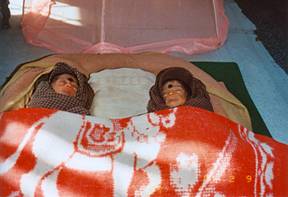 |
Her premature twins |
This writer had been selected to follow a course in basic Buddhism in the International Theravada Buddhist Missionary University of Myanmar in 2007. One of the earliest encounters was with the Tamil and Hindustani-speaking people who were living in the villages close by to the University. The Indians who had been brought to Burma by the British Raj have acculturated, but are disenfranchised. Inevitably, women and children carry the brunt of this political and economic deprivation. Myanmar – a country the roughly the size of Texas - has been governed by the military for almost 40 years and generations have no concept of democracy. Buddhism predominates the way of thinking and acting in the daily life of 90% of the population. The Hindus have incorporated Lord Buddha into the pantheon of Hindu gods and it is not unusual to see Burmese throng the Hindu temples seeking the blessings of the Gods, especially the poor women and children.
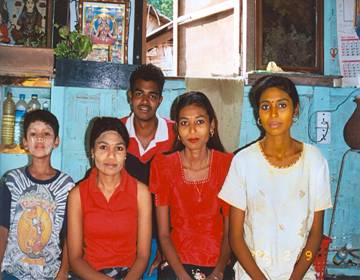 |
The young mother lived with her four siblings, mother and husband in a hut. |
The Public Health system in Myanmar is very marginal and access to health care can be a challenge for those with limited income. According to the United Nations, Myanmar’s population is 57.6 million (IMF estimate 2007); no official census has been taken since 1983. The infant mortality rate is 75 deaths/1,000 live births (UNDP 2005 estimate) and Life expectancy is 60.8 yrs. (males: 57.6 yrs. and females: 64.2 yrs.) (UNDP 2005 estimate). This became very evident when many of the Tamil as well as Myanmar women would communicate that they have lost their husbands or some immediate family members at a very young age. Dying from Dengue, Malaria, Typhoid, Hepatitis and gastro-intestinal diseases is very common.
The young Tamil vendor much to my surprise was at her final trimester of pregnancy, but malnourished with poor pre-natal care. She shyly explained that her income along with the husband’s was not enough, so only a glass of fresh ‘milk’ was the extra that they could afford. Her daily diet consisted mainly of starch – rice or bread - and one or two vegetables with a small piece of river fish. She would attend a pre-natal clinic in the downtown Yangon, where she would be among the many hundreds who would sit the whole day to be examined by one of the poorly paid medical doctors. She had not been made aware that she was pregnant with twins and was shocked when she had to give birth in a premature delivery with the help of a local mid-wife. She sent word for me and it was extremely painful to observe the crushing poverty and uncertainty surrounding this malnourished young woman and her premature set of twin daughters. The fearful rainy season was at its peak and the little hut could not protect this young family from air and water-borne disease. Inevitably one infant’s life was claimed - ‘survival of the fittest’.
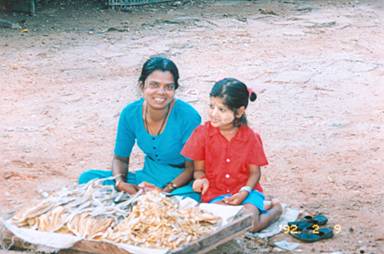 |
Young Tamil woman selling ‘dry fish’ by the roadside with her daughter. |
It was not long before many of the villagers wanted me to help them seek care for the myriad of health problems. The public health structure that had been left by the departing British was functioning, but needed support to care for the expanding young population. Yangon city and its outskirts could not cope with the ferocious rains that made the drainage sewers overflow, leaving thick, stagnant, polluted water that become a breeding ground for mosquitoes etc.
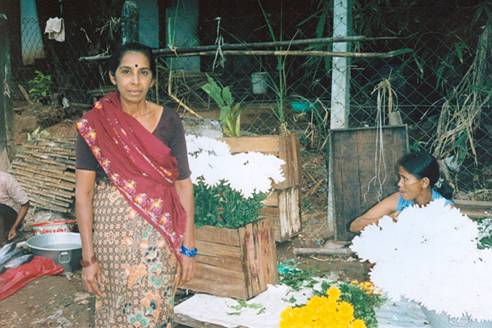 |
Hindustani flower seller |
I observed an indifference to the environment - a passive acceptance of what surrounds the villagers. There was no ‘will’ to overcome the obstacles - clear away the debris, wash the drain or the pavement. Chewing betel – betel leaf with Arica nut, pinch of tobacco and calcium chloride - was a national habit. People spat out the betel juice at random and ‘red spots of spittle dotted the pavement. I became deft at dodging ‘betel spit’ that would ‘shoot’ out from the buses or cars while passing! A virtual red spat! There is no talk about cancer or promotion to curtail this national public health menace. Where would one start? Explain to a poor woman that betel causes
oral pharyngeal cancer
when it is well known that, by chewing this leaf and nut, hunger pangs are kept at bay? To the wealthy I suggested replacing the betel with ‘chewing gum,’ as it was available at a price - the only pragmatic intervention to slow down the habit.
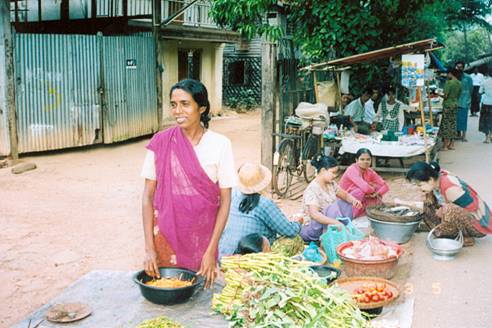 |
Hindustani vegetable seller |
The descendents of the Indians who have now accepted Myanmar as their adopted land continue to maintain their culture and tradition. The women would wear the traditional ‘saris’ to the temple and celebrate important festivals. I was privileged to participate in one such celebration and was astounded to observe the fervor and devotion exhibited. It was explained that, post-independence, the Burmese government passed a series of legislations that created an exodus of the immigrants who had settled in Burma during the time of the British. Their businesses had been nationalized and laws passed curtailing their rights to own lands, etc. So began the economic flight and followed by professionals seeking fresh pastures. Some of the Tamils have established businesses and continue to live and accepted life in Burma as they have no links with India. The very poor who were left behind on the plantations were severely economically deprived - lacking good education or skills, they literally eke out a living. They have no citizenship papers as well because it was explained to me that hurdles have been placed in the application process and corruption has made it even more beyond their reach. In Sri Lanka, too, disenfranchisement of the minority has taken place in stages as the majority has not been ready to accept the representation of the minority, in spite of the tremendous economic contribution that Tamils brought by the British make towards the export industry – tea.
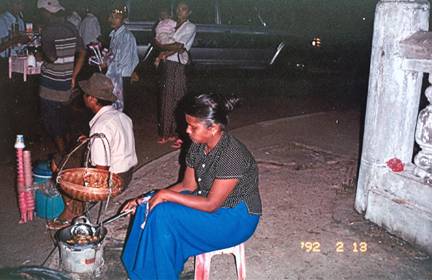 |
| Tamil woman selling fried food by the roadside |
Unlike in Sri Lanka where Theravada Buddhsim has mushroomed into a militant Buddhism with monks advocating war, Burmese monks continue to be the backbone of the community by emphasizing meditation, charity and compassion. Most monks live a very acetic lifestyle and are very visible on their daily rounds with their ‘alms bowl’. It is considered a privilege for a Buddhist family to have at least one male child ordained as a monk even for a limited period.
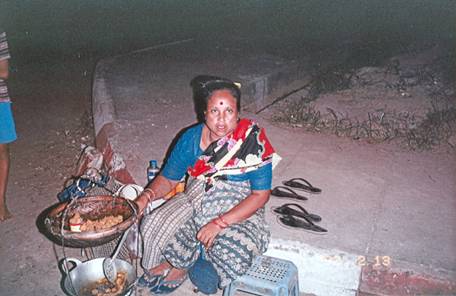
My spoken Myanmar language gradually picked up and I was able to converse with the local women and men who were eager to share their life stories. They were the most courteous, kind and gentle people and observation of the ‘Way of Life’ as advocated by Lord Buddha was observed. There were neither thieves nor hooligans, or lewd behavior, but one of respect and reverence. This was truly refreshing as this writer’s former home country was Sri Lanka where Buddhism has promoted hatred, violence and bitterness among the races. The Tamils and Hindustanis living in Burma would have words of praise with no experience of any negative emotions directed against them or instigated by the government, thus far. However, unlike Mahayana Buddhism, Theravada (Way of the Elders) has fostered a rigid, inflexible way of thinking. The schism took place after the demise of Lord Buddha, when Theravadins would insist on a rigorous, fundamental interpretation of Buddha’s teachings as opposed to the Mahayanists more ‘pragmatic’ approach that blended with the culture of the land in which it took root - Tibet, China, Japan, Vietnam. Thus, we can witness the impasse with the military in Myanmar even in a moment of such calamity - negotiate and compromise is not fostered or cultivated in the way of thought of Theravada Buddhism.
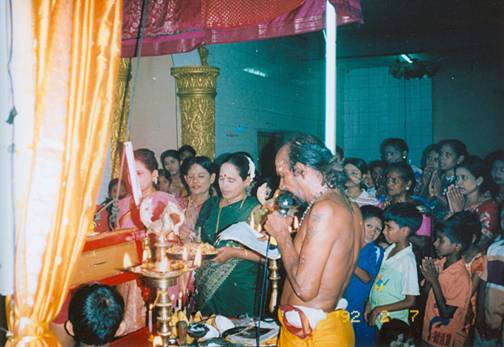 |
Celebration at the Hindu Temple. |
The lack of planning by the military government for the future of the education system is also having its dire results, and unemployment is rampant. The mismanagement of public resources - social grants, education, water, housing and electricity provision are visible in the quality of the life of the people. The youth simply loiter around or leave for other neighboring countries seeking their fortune. Young boys and girls work as ‘tea boys and girls’, domestic help and other labor-intensive chores that require working well into the night.
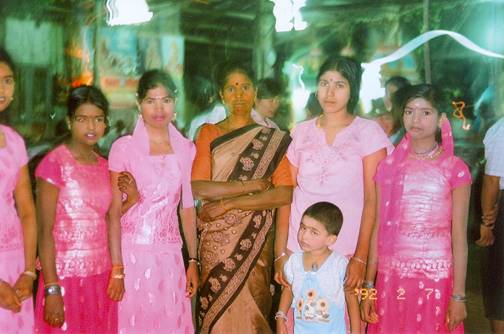 |
A group of Tamil women who had come to the Temple. |
The villagers became very disheartened when the time came for my departure. My knowledge in health care and presence had made some difference in their lives and someone had listened to their anxieties about the future. The women would tell me about their mentally ill children or lack of support to feed them and the battle to eke out an existence. Even while facing such crushing hardship they would smile and be so courteous and warm. Their personality too reflected tranquility even in the midst of such abject poverty. It was often requested by many mothers, “take my son with you’ as the daughters can always toil as domestic labor in wayside cafes or hotels. It was a depressive experience to observe young Tamil girls in rags toiling in the back drop while the fairer skinned Burmese would be the ‘servers’. Many Tamil women would insist that I apply Sandalwood paste to prevent sun burn and becoming ‘darker’.
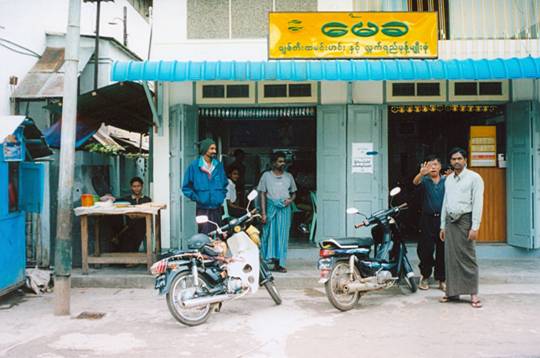 |
A hotel managed by Tamil men |
The hurricane and devastation that has happened recently in the lower Myanmar would bring more severe hardship to these poverty stricken people. Lord Buddha promoted an ‘enlightened’ way of thought and moderation in lifestyle but the leadership of Burma is very rigid and inflexible in their governance. Those who have ‘power’ keep the masses under a tight ‘leash’ all the while enjoying life to the full with creature comforts- it was ‘Animal Farm’ by George Orwell complete with ‘Horatio’ the ‘Dictatorial General’. Coincidentally, George Orwell had served as a young Civil Servant in Burma and had written brilliant observations of this land and its people. My gratitude remains with the Burmese people- they took me into their homes, showed kindness and taught me Lord Buddha’s word of Charity, compassion and meditation can bring peace of mind even when odds are against you.
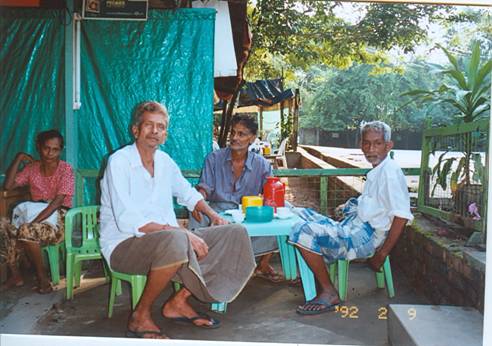 |
Hindustani and Tamil men who had served in the British government service- now retired. |
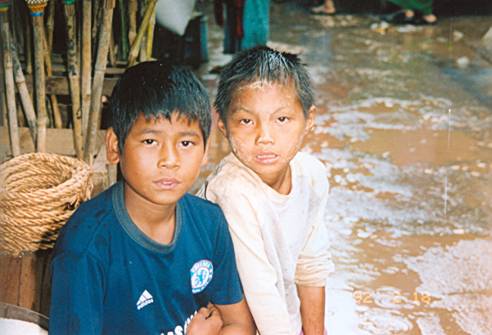 |
Two young boys working as ‘domestic servants’- they were accompanying the employer to market |
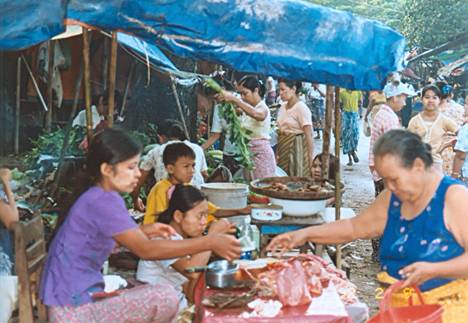 |
A busy market scene in the village. |
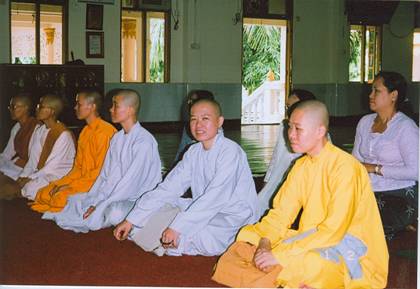 |
Mahayana nuns who studied with this writer |
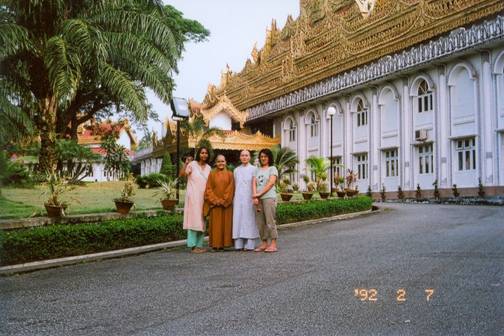 |
The writer with friends in front of the International Theravada Buddhist Missionary University of Myanmar. |
|
 Home
Home Archives
Archives














